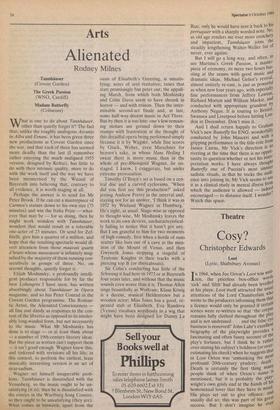Arts
Alienated
Rodney Milnes
Tannhiiuser (Covent Garden) Madam Butterfly (Coliseum)
what is one to do about Tannhauser, other than quietly forget it? The fact that, unlike the roughly analogous Ascanio in Alba and Ernani, it has been given three new productions at Covent Garden since the war, and that each of these has seemed more deadly than the last (I remember rather enjoying the much maligned 1955 version, designed by Koltai), has little to do with their intrinsic quality, more to do with the work itself and the way we have been mesmerised by the Wizard of Bayreuth into believing that, contrary to all evidence, it is worth staging at all.
Perhaps the answer is to send for Mr Peter Brook. If he can cut a masterpiece of Carmen's stature down to his own size (75 minutes) and win the Italia Prize — what- ever that may be — for so doing, then he might work wonders with Tannhauser, wonders that would result in a tolerable one-acter of 23 minutes. Or send for Zef- firelli, give him a quarter of a million, and hope that the resulting spectacle would di- vert attention from those mauvais quarts d'heure whose mauvaisete is infinitely mag- nified by the majority of them running con- secutively in groups of three. No, on second thoughts, quietly forget it.
Elijah Moshinsky, a profoundly intelli- gent producer responsible for by far the best Lohengrin I have seen, has written absorbingly about Tannhouser in Opera magazine, and so has Peter Conrad in the Covent Garden programme. The Roman- tic Artist, the Alienated Consciousness --- all fine and dandy as responses to the con- tent of the libretto as opposed to its intoler- ably long-winded form, but not necessarily to the music. What Mr Moshinsky has done is to stage — or at least think about — a number of 19th-century literary ideas. But the piece as written can't support them — it isn't good enough. Wagner knew this. and tinkered with revisions all his life; in this context, to perform the earliest, least musically interesting version is an act of near-sadism.
Wagner set himself insuperable prob- lems. Tannhauser is dissatisfied with the Venusberg, so the music ought to be un- satisfying (it is); then he is dissatisfied with the entries in the Wartburg Song Contest. so they ought to be unsatisfying (they are). What comes in between, apart from the
oasis of Elisabeth's Greeting, is unsatis- fying: acres of arid recitative; tunes that start promisingly but peter out; the appall- ing March, from which both Moshinsky and Colin Davis seem to have shrunk in horror — and with reason. Then the inter- minable second-act finale and,. at last, some half-way decent music in Act Three. But by then it is too late: one's few remain- ing molars are ground down to their stumps with frustration at the thought of this dreadful opera being performed simply because it is by Wagner, while fine scores by Gluck, Weber, even Marschner for heaven's sake, in whose Hans Heiling I swear there is more music than in the whole of pre-Rheingold Wagner, lie un- staged. I know, I exaggerate, but under extreme provocation.
Timothy O'Brien's set is based on a cen- tral disc and a curved cyclorama. 'When did you first see this production?' asked jesting Andrew Porter in the interval and, staying not for an answer, 'I think it was in 1952 by Wieland Wagner in Hamburg.' He's right, as usual. Stage-wise as opposed to thought-wise, Mr Moshinsky leaves the work to its own devices, uncharacteristical- ly failing to notice that it hasn't got any. But I am grateful to him for two moments of high comedy, first when a horde of nuns scatter like bats out of a cave at the men- tion of the Mount of Venus, and then Gwyneth Jones stopping a stageful of Teutonic Knights in their tracks with a piercing top B (or thereabouts).
Sir Colin's conducting has little of the Schwung it had here in 1973 or at Bayreuth four years later, and without that the music sounds even worse than it is. Thomas Allen sings beautifully as Wolfram; Klaus K6nig is a decent, musical Heldentenor but a wooden actor; Miss Jones has a good, re- peated stab at Elisabeth. Eva Randova (Venus) vocalises wordlessly in a wig that might have been designed for Danny La Rue, only he would have sent it back to his perruquier with a sharply worded note. No, as old age renders me ever more crotchety and impatient, Tannhtiuser joins the steadily lengthening Walter-Weller list of never, ever agains. But I will go a long way, and often, to see Martinu's Greek Passion, a master- piece of economy, its mere two hours bur- sting at the seams with good music and dramatic ideas. Michael Geliot's revival, almost entirely re-cast, is just as powerful as when new four years ago, with especially fine performances from Jeffrey Lawton, Richard Morton and William Mackie, and conducted with appropriate grandeur hY Anthony Negus. It is touring to Bristol. Swansea and Liverpool before hitting Lon- don in December. Don't miss it.
And I shall return happily to Graham Vick's new Butterfly for ENO, wonderfullY conducted by John Mauceri and with a gripping performance in the title-role from Janice Cairns. Mr Vick's direction is s° riveting at the time that there is no opPnr- tunity to question whether or not his inter- pretation works. I have always thought Butterfly one of Puccini's most sinister sadistic rituals, in that he tricks the audi" ence into joining in; Mr Vick seems to see it as a clinical study in mental illness 1111 which the audience is allowed — incleeu, encouraged — to distance itself. I wonder. Watch this space.














































 Previous page
Previous page